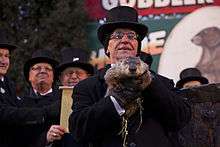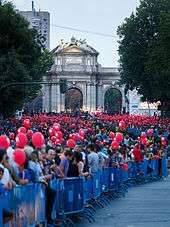Media event
A media event, also known as a pseudo-event,[1] is an event, activity, or experience conducted for the purpose of media publicity. It may also include any event that is covered in the mass media or was hosted largely with the media in mind.[2] Media events may center on a news announcement, an anniversary, a news conference, or planned events like speeches or demonstrations. Instead of paying for advertising time, a media or pseudo-event seeks to use public relations to gain media and public attention.

The term pseudo-event was coined by the theorist and historian Daniel J. Boorstin in his 1961 book The Image: A Guide to Pseudo-events in America: “The celebration is held, photographs are taken, the occasion is widely reported.”[3] The term is closely related to idea of hyperreality and thus postmodernism, although Boorstin's coinage predates the two ideas and related work of postmodern thinkers such as Jean Baudrillard. A media event being a kind of planned event, it may be called inauthentic in contrast to a spontaneous one.
In distinguishing between a pseudo-event and a spontaneous one, Boorstin states characteristics of a pseudo-event in his book titled "Hidden History." He says that a pseudo-event is: dramatic, repeatable, costly, intellectually planned, and social. It causes other pseudo-events, and one must know about it to be considered "informed".[4]
Similarly, Elihu Katz outlines the defining characteristics of a media event as: immediate (i.e., it is broadcast live), organized by a non-media entity, containing ceremonial and dramatic value, preplanning, and centering on a personality, whether that be a single person or a group[5]
A number of video artists have explored the concept of a pseudo-event. The group Ant Farm especially plays with pseudo events, though not so identified, in their works "Media Burn" (1975) and "The Eternal Frame" (1975).
Types

A news conference is often held when an organization wants members of the press to get an announcement simultaneously. The in-person events may include interviews, questioning, and show-and-tell.
Media events like news conferences can come to be expected, especially before, during, and after sporting events, and the National Football League demands that its players provide a weekly media event by taking postgame questions from reporters. When Seattle Seahawks running back Marshawn Lynch dressed and left the stadium after a loss on Nov. 16, 2014, the NFL fined him $100,000.[6]
Award ceremonies, red carpet events and celebrity photo opportunities are all considered a type of media event, where the event is orchestrated for the purpose of introducing a chosen narrative into the media.
Sex tapes when created with the intention of being 'leaked' are a form of pseudo event because their purpose is to generate media attention.
A protest may be planned almost exclusively for the purpose of getting media attention to an issue or cause.
Political conventions, or planned presentations or speeches about company earnings or political issues, are a form of media event.
Historic examples
Media events became prominent when the media did. The driving of the Golden Spike in Promontory Summit, Utah, in 1869 has been described as one of the first media events in the United States. Edward Bernays and his Torches of Freedom campaign in 1929 is an example of an early media event that successfully influenced public opinion. Similarly, Nikita Khrushchev visit to the United States in 1959 was highly influential, and has been cited as the first example of media events being utilised in politics.[7]
Media events became practical in the middle 19th century as the Morse telegraph and the expansion of daily newspapers introduced same-day news cycles. The emergence of the internet led to many media stories being published live from the media event, real-time Twitter coverage, and immediate analysis of televised media events. When musical artist Prince pretended to take questions during his Super Bowl press conference but instead broke immediately into song, his performance itself became a meta media-event-within-a-media-event[8]
References
- Scherer, Helmut. "Media Events and Pseudo-Events". Blackwell Reference Online.
- The American Heritage Dictionary of the English Language, Fourth Edition. "media event". Houghton Mifflin Company. Retrieved 2006-09-15.
- Boorstin, Daniel Joseph (1961). The image: A guide to pseudo-events in America. New York: Vintage. ISBN 0-679-74180-1.
- Boorstin, D. Hidden History. Harper & Row, 1987. 279-280. Print.
- Katz, Elihu. "Media Events: The Sense of Occasion". University of Pennsylvania ScholarlyCommons.
- Werder, Ed. "Silence Costs Marshawn Lynch $100K". ESPN.
- Mueller, Andrew. "Defining Moment: Nikita Khrushchev's visit to the US becomes the first 'pseudo-event', September 1959". Financial Times.
- "Prince--The Super Bowl Press Conference 2007". Wat. Archived from the original on 2015-01-09.
General sources
- Bösch, Frank: European Media Events, European History Online, Mainz: Institute of European History, 2010, retrieved: June 13, 2012.
- Daniel Dayan and Elihu Katz, Media Events: The Live Broadcasting of History (Cambridge: Harvard University Press, 1992).